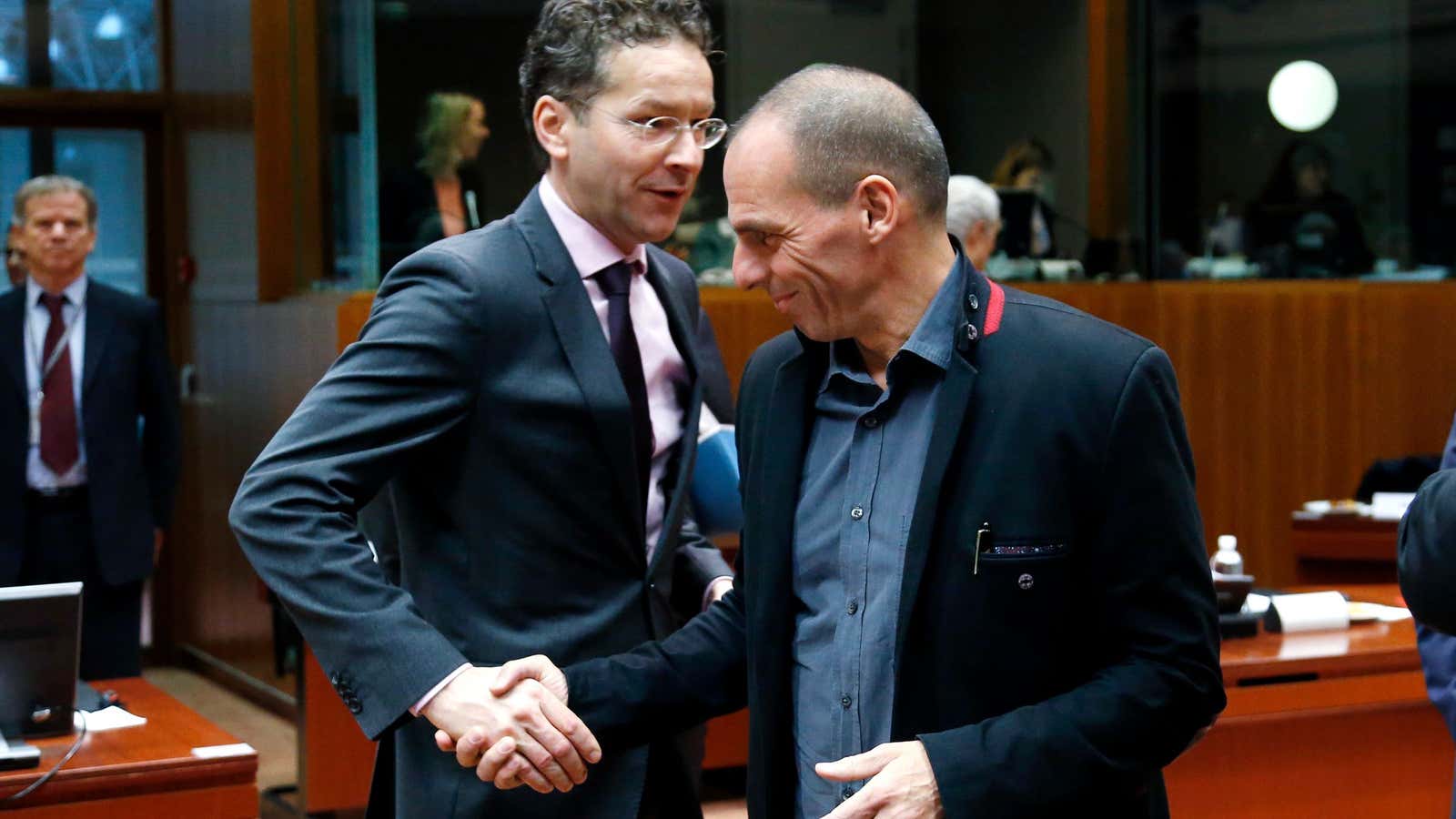Just a few words prevented Greece and the rest of the euro zone from reaching an agreement that would keep the troubled Mediterranean nation solvent long enough for its new government to reach a new deal with creditors. The talks ran aground yesterday when the Greeks refused to sign a statement saying they ”intend to successfully conclude the program,” according to leaked drafts.
We can’t decide which side is being more obstinate: The Greeks for refusing to agree to that statement, or their creditors for insisting on it. (If you already know the background, click here to skip it and get to our debate.)
The background
The program in question is the package of austerity policies that Greece committed to in 2010 in return for some €240 billion ($273 billion) in loans from the “troika”—the International Monetary Fund (IMF), the European Commission, and the European Central Bank. The conditions attached to these loans have seen Greece turn budget deficits into surpluses and allowed it to tap bond markets on its own. But along the way they have also demolished the country’s economy. Perversely for something ostensibly designed to cut the country’s debt, the “program” has caused Greece’s debt burden (debt relative to GDP) to go up, and stunted the country’s ability to grow.
Hence the election last month of the upstart Syriza party. It leads a tough-talking government that wants to roll back some of the most growth-killing and hardship-inducing parts of the program, and also those that offend its left-wing ideology.
But the IMF said in June last year that, even with the program in place, Greece would face a €12.6 billion financing gap this year. In other words, the multiple rounds of bailouts, write-downs, repayment extensions, and other tweaks to the program have not yet put the country on a stable financial footing. And borrowing this amount in the open market at high interest rates is not realistic.
In short, the program isn’t enough. Endorsing it means essentially endorsing another bailout, which some reckon will need to be worth more than €50 billion over the next three years (paywall) to have a meaningful impact. You can understand, then, why the word “program” has become a little poisonous to Greek ears.
Hence the entrenched positions: Finance minister Yanis Varoufakis says the Greek government will agree to maintain a fiscal surplus, pay its creditors in full, and not abandon reforms that have been implemented, but won’t endorse an insufficient program—“we do not believe it is a program that can be successfully completed.” His testy interlocutor, Dutch finance minister Jeroen Dijsselbloem, stresses that there must be a ”a commitment from the Greek authorities to successfully conclude the program.” Dijsselbloem leads the “Eurogroup” gathering of euro zone finance ministers, which happens to be Greece’s biggest creditor group by some distance.
The debate
So which one of them is being more petulant? As is our wont, Quartz reporters started debating this in our virtual newsroom.
Tim explained what it looks like from the Greek side. Even German finance minister Wolfgang Schäuble told German voters in 2013 that another Greek bailout was inevitable. So insisting that Greece endorse a failed policy before agreeing to fix it is akin to firefighters demanding you endorse their failed plan of adding fuel to the fire before considering a water-based solution.
Jason laid out the case for the creditors. Greece is basically arguing about wording, not substance. Varoufakis himself said he was happy with a draft proposal that bound Greece to a range of reforms and fiscal commitments in return for “an extension of the current loan agreement.” Is that so different from “the current program”? It is akin to arguing with the firefighters over the brand of their hose while your house burns down.
In the end, this is really about negotiating positions: Creditors want Syriza to endorse their strategy so that the new government won’t begin rolling back austerity willy-nilly while negotiating a new bailout deal. Syriza, meanwhile, wants the troika to implicitly acknowledge that the plan to date hasn’t worked, so the party can fulfil its election pledge and devise a new solution free from the baggage of the past.
Reports are now emerging that suggest the Greeks will ask for an extension of the bailout tomorrow. But will they call it a program? And if not, will their creditors accept it? Someone, eventually, will rise above the squabbling. Right?
